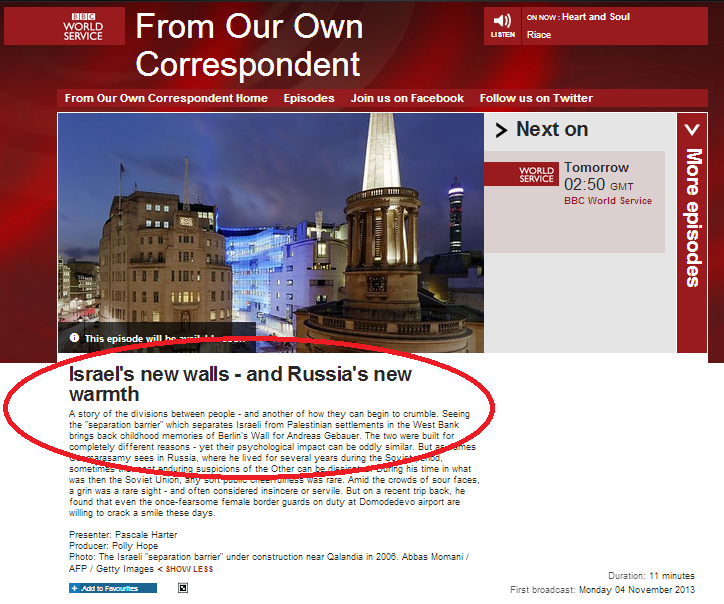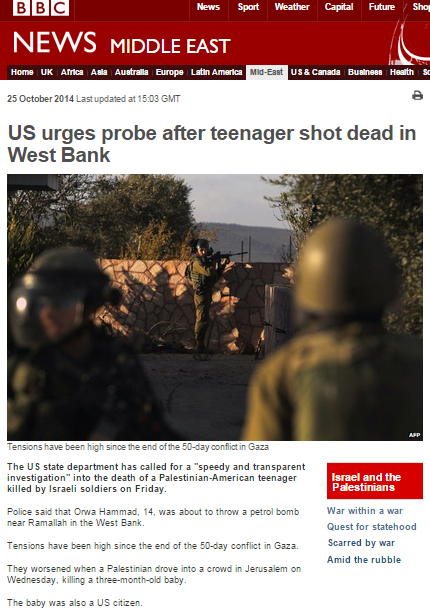h/t DA
It is with tedious regularity that we find ourselves addressing here the subject of breaches of accuracy and impartiality guidelines in the programme ‘From Our Own Correspondent’ which is broadcast on BBC Radio 4 (10.97 million listeners per week) and on the BBC World Service (192 million listeners).
The programme’s latest edition – broadcast on Radio 4 on October 31st and scheduled for broadcast on the World Service on November 4th – includes an item by Andreas Gebauer of the BBC World Service. The item can be heard here from 11:32 or here.
The synopsis to the World Service edition of the programme reads as follows:
“A story of the divisions between people – and another of how they can begin to crumble. Seeing the “separation barrier” which separates Israeli from Palestinian settlements in the West Bank brings back childhood memories of Berlin’s Wall for Andreas Gebauer. The two were built for completely different reasons – yet their psychological impact can be oddly similar.”
The synopsis of the Radio 4 edition states:
“Andreas Gebauer finds parallels between Israel’s security barrier and the Berlin wall which he first saw as a young boy”.
Kate Adie’s introduction of the Radio 4 version begins thus:
“Israel this week released twenty-six Palestinian prisoners as part of a deal connected to the latest peace talks between the two sides. The Israeli prime minister has been telling his parliament he’s making a real effort to secure a peace deal with the Palestinians. Precisely what’s been discussed isn’t being revealed. The Palestinians are known to be concerned about the four hundred mile-long separation barrier Israel has built in the West Bank to prevent – it says – attacks being launched against its citizens. Seeing it has reminded Andreas Gebauer of another wall; the one that divided Berlin and his native Germany.”
In other words, rather than taking the opportunity provided by the recent release of convicted terrorists to impart some insight to BBC audiences as to how the families of their victims regard this event, the BBC chooses to use it as a hook upon which to hang yet another pernicious ‘opinion piece’ on one of Israel’s means of preventing exactly such acts of terror, promoting the meme of the ‘Berlin wall’ comparison so often employed by anti-Israel activists.
Adie’s claim of a “four hundred mile-long separation barrier Israel has built in the West Bank” is clearly inaccurate. The anti-terrorist fence has not been completed and the sections so far constructed – 69% of the project as of August 2012 – are 491.9 kms (305.6 miles) long. Neither is the fence “built in the West Bank” as Adie claims. Its route is determined by security and topographical considerations with most of it situated on the 1949 Armistice lines.
As is all too often the case, Adie’s snide insertion of the words “it says” implies to listeners that the rationale behind the fence’s construction is to be doubted and conceals from them the long-known facts proving its effectiveness.
“A comparison of the above data shows a decrease of slightly more than 90% in the number of attacks: from an average of 26 attacks a year before the fence, to three attacks after erection of the anti-terrorist fence. This means a decrease of more than 70% in the number of Israelis murdered: from an average of 103 slain per year before the fence to 28 after erection of the fence. Similarly, this means a drop of more than 85% in the number of wounded: from an average of 688 a year before the fence to 83 wounded per year after it was built. ”
Andreas Gebauer begins his piece with the biblical story of the fall of the walls of Jericho, but soon moves on to pastures political.
“Now, a new wall has gone up in Canaan. It snakes its way across hills, follows motorways, hugs buildings, cuts through roads and farms. In the hilly countryside it stands out; an ever-present reminder of the unresolved Middle East problem.”
Apparently not aware of the fact that Canaan ceased to exist in the Iron Age, Gebauer is obviously equally oblivious of the fact that the Arab-Israeli conflict is – as the past three years have amply demonstrated – far from being “the unresolved Middle East problem”. He continues:
“Of course I knew it would bring back memories of the Berlin wall which I’d first seen as a young boy. When you stand next to it, as I did east of Jerusalem, the similarities are eerie. The same prefabricated slabs, the same watch-towers, even the graffiti – some angry, some witty. Only this wall seems to be much higher – eight meters, I later find out – more than twice as high as the Berlin wall.”
Gebauer does not bother to point out to his listeners that less than 10% of the anti-terrorist fence is actually a wall, with the vast majority being a chain-link fence. Neither does he clarify that the sections which are constructed of concrete slabs are designed to prevent snipers from shooting at civilians – an issue which East Germany did not need to take into account when its wall was constructed for entirely different reasons. Gebauer goes on:
“To most Palestinians it’s impenetrable: not only to would-be attackers, but also to the mass of Palestinians looking for work. The few Palestinians that are allowed to cross it may have to wait for up to four hours at the checkpoint.”
Gebauer’s historical difficulties continue: he airbrushes from his account the establishment of the Palestinian Authority under the terms of the Oslo Accords twenty years ago by suggesting that residents of PA controlled areas “looking for work” should have free access to areas in which they neither reside nor are citizens. In fact, the number of Palestinians allocated permits to work in Israel is currently at its highest since the start of the second Intifada in 2000. 48,000 permanent permits and 3,000 temporary permits are allocated to Palestinians and a further 27,000 work in industrial zones or communities in Judea & Samaria. During the month of Ramadan this year, over 200,000 Palestinians were issued with permits to visit Israel and in the first half of 2013, 4,545,854 Palestinians crossed into Israel.
According to Gebauer, however, those numbers represent a “few”.
Gebauer then recounts a personal anecdote before continuing:
“So, much bigger was their [the German people] surprise when a few years later they saw a new wall go up just east of Jerusalem. Not dividing the city, but keeping out its Palestinian hinterland. The Israeli economy may be doing well, but that Palestinian hinterland is clearly suffering. Bethlehem, just a few miles from Jerusalem, shows all signs of massive unemployment, stagnation and squalor.”
Again, Gebauer ignores the fact that Bethlehem, along with what he bizarrely terms Jerusalem’s “Palestinian hinterland”, is under Palestinian Authority control and responsibility – and has been for nearly two decades. He continues:
“On the hill opposite, sheltered by the wall and overlooking the countryside like a modern medieval castle, sits Har Homa – one of the many Israeli settlements that have sprung up east of Jerusalem.”
Here we once again see BBC’s partial adoption of the terminology used by the Palestinian Authority to describe neighbourhoods of Jerusalem – in this case a suburb built largely on land which was purchased by Jews before 1948. Gebauer goes on:
“They look well-built, in their gleaming white concrete, their roofs not cluttered up with black water tanks like those of the Palestinian houses. Unlike the settlements, most Palestinian towns and villages receive water for only a few hours a day.”
Yet again, Gebauer makes no attempt to explain to his listeners that the water supply to Palestinian towns and villages in Areas A and B is the responsibility of the Palestinian Water Authority according to the terms of the Oslo Accords and so any supply problems which may exist should be addressed by that body. He continues:
“When you travel through the West Bank you can’t help feeling that most of it has already been incorporated into Israel. The road numbers are Israeli. The bathing complex on the Dead Sea is Israeli. The Qumran Caves – where centuries-old Jewish scrolls were found – form part of an Israeli national park. The road along the River Jordan, with an electrified fence facing the neighbouring Kingdom of Jordan, is dotted with small Israeli settlements. The only Arab presence is a derelict barracks, vacated by the Jordanian army when it left in a hurry in 1967.”
Gebauer’s “road along the River Jordan” is route 90 – and it has an Israeli road number because, like the rest of the roads in the area, it was constructed by Israel. Between the north of the Dead Sea and the Bazaq (Mehola) crossing, Gebauer would have had to pass numerous Arab towns and villages including Jericho (population 17,000), Zubaydat, Marj Na’je, Fasa’il, Bardale, Tel Albeida and Tel Al Khama. Apparently he was unable to distinguish them from “small Israeli settlements” just as he is clearly unable to tell the difference between an electronic monitoring fence marking an international border and an “electrified” one. He goes on:
“And yet, there is a huge Arab presence, even in Israel proper. Head north to Galilee and you encounter numerous Arab villages and towns, the minarets of their mosques and the steeples of their churches shining proudly in the sun. Their residents – now more than 1.6 million – were allowed to stay after 1948, even given Israeli citizenship.”
The use of the phrase “allowed to stay” of course fails to reflect the fact that Israel’s Declaration of Independence included a specific call to Arab residents of the area at the time:
“We appeal – in the very midst of the onslaught launched against us now for months – to the Arab inhabitants of the State of Israel to preserve peace and participate in the upbuilding of the State on the basis of full and equal citizenship and due representation in all its provisional and permanent institutions.”
Gebauer continues:
“The wall makes a re-appearance on the way back to the airport, next to the motorway leading from Galilee to Tel Aviv. Behind it, the Palestinian town of Tulkarem. To the right, in the distance, the high-rise blocks along the Israeli coastline. This is the point where Israel proper is barely ten miles wide; no distance for a good enemy army.”
Where exactly Gebauer accessed the motorway (Route 6) we do not know, but whether it was at the Ein Tut interchange or the Ir’on interchange, he would have travelled quite a distance before having any view of the short section of the anti-terrorist fence near Tulkarem which is constructed from concrete. Apparently, the road’s proximity to Tulkarem – a town with a history of terrorist infrastructure – did little to enhance Gebauer’s understanding of the need for protection from sniper attacks and other types of terrorist activity or his comprehension of the fact that the function of the anti-terrorist fence is not to halt “a good enemy army” engaged in conventional warfare.
Gebauer then begins his conclusion:
“Yet whether the wall is the answer to Israel’s undoubted security needs is questionable. Walls may – for a while – bring relief to a symptom; they don’t solve the problem itself.”
Ironically, Gebauer has managed to get through his entire item without naming “the problem itself” – terrorism – and he is not about to rectify that.
“The Berlin wall certainly saved East Germany from imminent economic collapse, but it didn’t rescue it in the long run, creating hardship and huge resentment in the process. Similarly, Israel’s security barrier is unlikely to be the long-term answer. It’s a blot on the landscape and doesn’t help Israel’s image.”
Apparently “image” and aesthetics trump civilian lives in Gebauer’s world.
“What’s required now are two wise and courageous politicians to emerge on both sides and fortunate circumstances. We may have to wait for a while, but so did the people of Berlin.”
Beyond its multiple accuracy failures, this broadcast is clearly no more than a politically motivated polemic which adopts both its theme and its language from the repertoires of anti-Israel campaigners. What it certainly does not do is to provide BBC audiences with any “insight” (as claimed in the programme blurb) into why the anti-terrorist fence had to be built or why its presence is still a regrettable necessity. Gebauer’s total abstention from any serious mention of the subject of Palestinian terrorism indicates that he did not intend to inform his audiences at all: his frankly repugnant ‘moral’ posturing and his co-opting of childhood memories are merely a vehicle for the promotion of an all too transparent political standpoint – in clear breach of BBC guidelines on impartiality.







